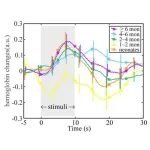(Press-News.org) SAN DIEGO ― Two clinical trials led by researchers from The University of Texas MD Anderson Cancer Center demonstrated early positive results from novel therapies targeting menin for the treatment of relapsed or refractory acute leukemias with specific genetic alterations. Results from the studies were shared today in oral presentations at the 2023 American Society of Hematology (ASH) Annual Meeting. More information on all ASH Annual Meeting content from MD Anderson can be found at MDAnderson.org/ASH.
Menin inhibitor monotherapy reduces disease burden in majority of relapsed or refractory acute leukemia patients (Abstract 57)
According to data from a Phase I trial led by Elias Jabbour, M.D., professor of Leukemia, the menin inhibitor JNJ-75276617 showed early clinical activity in patients with relapsed or refractory acute leukemias and genetic alterations in KMT2A or NPM1, which are associated with poor clinical outcomes.
Among 66 patients able to be evaluated after one month of treatment, JNJ-75276617 monotherapy reduced bone marrow disease burden in 71%, and 33 of those patients had a decrease in bone marrow blasts of more than 50%. Median time to first response was less than two months. Similar response rates were observed across patient groups with both genetic alterations.
“Patients with relapsed or refractory leukemias and KMT2A or NPM1 alterations often do poorly on currently available therapies, so there is a need to advance more effective options,” Jabbour said. “We are encouraged by the antileukemic activity of this monotherapy, which mimics what we saw in the preclinical setting.”
In the multi-center clinical trial, researchers took a stepwise approach in evaluating the safety and efficacy of JNJ-75276617, a potent and selective inhibitor of the interaction between the scaffolding protein menin and the methyltransferase KMT2A. Eighty-six patients who had acute leukemias with NPM1 & KTM2A genetic alterations were included in the trial.
Patients received the therapy orally on a 28-day cycle. Fifty-six percent of evaluable patients had AML with KMT2A alterations and 43% of evaluable patients had NPM1 alterations. The median age of trial participants was 63 years, while the median number of prior therapies was two.
Differentiation syndrome was the most common side effect in patients, but was overcome with step-up dosing. The trial is ongoing to determine the recommended Phase II dose.
The trial is sponsored by Janssen Pharmaceuticals. A complete list of collaborating authors and their disclosures can be found with the abstract.
Oral therapy combination shows promising results for advanced acute leukemias (Abstract 58)
The Phase I/II SAVE trial, led by Ghayas Issa, M.D., assistant professor of Leukemia, combined the menin inhibitor revumenib with venetoclax and hypomethylating agent ASTX727, yielding encouraging responses in adult and pediatric patients with relapsed or refractory advanced acute myeloid leukemia (AML) with KMT2A or NUP98 rearrangements or NPM1 mutations.
The overall response rate among nine evaluable patients was 100%. Three patients achieved complete remission, one patient achieved complete remission with partial hematologic recovery, and three patients had complete remission with incomplete platelet count recovery. In addition, one patient had a partial response and one had a morphologic leukemia-free state. Measurable residual disease was undetectable in six of the patients.
“These advanced and acute leukemias often are very difficult to treat and currently have no approved targeted therapies. We believe these early results suggest this treatment will be highly effective in advanced leukemias,” Issa said. “This is our first look at an entirely oral combination therapy using menin inhibitors, and the results are very encouraging. If sustained in further trials, this could lead to a change in the standard of care for this patient population, with great potential to improve their quality of life.”
Revumenib is a potent, oral, selective inhibitor of the menin-KMT2A interaction. To date, nine patients aged 12 years and older have been enrolled in the trial. Of those, five patients had KMT2A rearrangements, three had NUP98 rearrangements and one had mutant NPM1. On average, patients had received three prior lines of therapy.
Side effects were manageable and consistent with previous studies. The trial is ongoing, with plans to establish the recommended Phase II dose and optimize delivery of the combination before enrolling patients in the Phase II cohort.
This investigator-initiated study was supported by Syndax and Astex. A complete list of collaborating authors and their disclosures can be found with the abstract.
Read this press release in the MD Anderson Newsroom.
END
ASH: Novel menin inhibitors show promise for patients with advanced acute myeloid leukemias
Two MD Anderson-led trials demonstrate encouraging activity for leukemias with specific genetic mutations
2023-12-09
ELSE PRESS RELEASES FROM THIS DATE:
ASH: Targeted oral therapy reduced disease burden and improved symptoms for patients with rare blood disorder
2023-12-09
SAN DIEGO ― The targeted therapy bezuclastinib was safe and rapidly reduced markers of disease burden while also improving symptoms for patients with a rare blood disorder called nonadvanced system mastocytosis, according to results of the Phase II SUMMIT trial reported by researchers at The University of Texas MD Anderson Cancer Center.
The findings, presented today at the 2023 American Society of Hematology (ASH) Annual Meeting, demonstrate that all participants treated with bezuclastinib achieved at least a 50% reduction in markers of disease burden and 63% reported their disease symptoms eased within 12 weeks. That number increased to 78% after ...
New Sylvester cancer study provides insight into underlying gene mutations in myelodysplastic syndromes
2023-12-09
EMBARGOED UNTIL DECEMBER 9, 2023, AT 12:45 P.M. ET
A new study from researchers with Sylvester Comprehensive Cancer Center at the University of Miami Miller School of Medicine and collaborating organizations provides insight into the underlying mechanisms of gene mutations commonly seen in patients with myelodysplastic syndromes (MDS) and other myeloid neoplasms.
Their findings, to be presented at ASH 2023, the American Society of Hematology’s annual meeting in Santa Diego, Dec. 9-12, could lead to development of more effective drug combinations ...
First-in-human clinical trial of CAR T cell therapy with new binding mechanism shows promising early responses
2023-12-09
SAN DIEGO – Early results from a Phase I clinical trial of AT101, a new CAR T cell therapy that uses a distinct binding mechanism to target CD19, show a 100 percent complete response (CR) rate at the higher dose levels studied in the trial, according to researchers from the University of Pennsylvania Perelman School of Medicine and Penn Medicine’s Abramson Cancer Center. The findings were published today in Molecular Cancer and presented at the 65th American Society of Hematology (ASH) Annual Meeting ...
Long-term results show combination treatment that skips chemotherapy is effective for older patients with Ph+ ALL
2023-12-09
Older patients with Philadelphia chromosome-positive (Ph+) acute lymphoblastic leukemia (ALL) who were not good candidates for the standard treatment of intensive chemotherapy had a median overall survival (OS) of 6.5 years on an alternate regimen of dasatinib and blinatumomab.
These long-term results from the S1318 clinical trial will be presented at the 65th American Society of Hematology (ASH) Annual Meeting and Exposition in San Diego on December 9 (abstract 1499).
Anjali S. Advani, MD, a SWOG investigator at Cleveland Clinic Cancer Institute, led the study, with ...
Mindfulness could help women with opioid use disorder better control drug urges
2023-12-09
Mindfulness-Oriented Recovery Enhancement (MORE) — a behavioral intervention that integrates training in mindfulness, emotion regulation strategies and savoring of natural rewards — could hold the key to mitigating relapse in women undergoing medically assisted opioid use disorder treatment, a Rutgers study found.
The pilot study published in the journal Explore, is the first to evaluate the potential neural changes that underlie women’s emotion regulation and craving after an eight-week MORE intervention.
Previous studies have shown that women report higher opioid craving and show a greater inability to ...
TTUHSC’s ARPA-H membership will spur innovation, improve access for West Texas patients
2023-12-09
Imagine if scientists developed a customizable cancer vaccine that was available — and affordable — for everyone. What if a patient scheduled for surgery also had the option of taking a pill whose composition includes nanorobotics capable of performing the procedure?
These and other medical scenarios may seem far-fetched and better suited to a science fiction thriller. However, the Advanced Research Projects Agency for Health (ARPA-H) is seeking to take such ideas from the drawing board to ...
Global annual finance flows of $7 trillion fueling climate, biodiversity, and land degradation crises
2023-12-09
Almost US$7 trillion per year in government subsidies and private investment - around 7 per cent of global GDP - has a direct negative impact on nature.
Nature-based solutions remain dramatically underfunded. Current public and private finance flows are only US$200 billion per year. To meet climate, biodiversity, and restoration targets, this needs to triple by 2030 and quadruple by 2050.
Realignment of public and private nature-negative finance flows is urgently needed
Dubai, 9 December 2022 – Close to $7 trillion is invested globally each year in activities that have a direct negative impact on nature from both public and private sector sources - equivalent to ...
Tracing how the infant brain responds to touch with near-infrared spectroscopy
2023-12-09
Tokyo, Japan – Researchers from Tokyo Metropolitan University have measured how oxygenated hemoglobin levels in the blood change in infants’ brains in response to touch. Using spectroscopy methods with external sensors placed on the scalp of sleeping infants, they found that the time at which levels peak doesn’t change with infant age, but the amount by which it varies over time does. Insights like this shed light on how the physiology of infants develop.
The first phase of a newborn’s life is a dazzling array of rapid developmental ...
These are the world's most effective charities
2023-12-09
Which charities will be most effective in ensuring your donation is put to good use? For the first time in the Netherlands, researchers applied scientific methods to pinpoint which charities achieve the most with the donations they receive. The University of Amsterdam and Stichting Doneer Effectief (Donate Effectively Foundation) unveiled the list on Friday, 8 December, during a sold out evening in Rotterdam. ‘We are talking about the Champions League of good causes,’ says professor of Philanthropy & Sustainable Investment Paul Smeets of the University of Amsterdam. The ranking ...
When is an aurora not an aurora?
2023-12-08
The shimmering green, red and purple curtains of the northern and southern lights — the auroras — may be the best-known phenomena lighting up the nighttime sky, but the most mysterious are the mauve and white streaks called Steve and their frequent companion, a glowing green "picket fence."
First recognized in 2018 as distinct from the common auroras, Steve — a tongue-in-cheek reference to the benign name given a scary hedge in a 2006 children's movie — and its associated picket fence were nevertheless thought to be caused by the same physical processes. But scientists were left scratching their heads about how these glowing emissions ...
LAST 30 PRESS RELEASES:
GLP-1 drugs associated with reduced need for emergency care for migraine
New knowledge on heritability paves the way for better treatment of people with chronic inflammatory bowel disease
Under the Lens: Microbiologists Nicola Holden and Gil Domingue weigh in on the raw milk debate
Science reveals why you can’t resist a snack – even when you’re full
Kidney cancer study finds belzutifan plus pembrolizumab post-surgery helps patients at high risk for relapse stay cancer-free longer
Alkali cation effects in electrochemical carbon dioxide reduction
Test platforms for charging wireless cars now fit on a bench
$3 million NIH grant funds national study of Medicare Advantage’s benefit expansion into social supports
Amplified Sciences achieves CAP accreditation for cutting-edge diagnostic lab
Fred Hutch announces 12 recipients of the annual Harold M. Weintraub Graduate Student Award
Native forest litter helps rebuild soil life in post-mining landscapes
Mountain soils in arid regions may emit more greenhouse gas as climate shifts, new study finds
Pairing biochar with other soil amendments could unlock stronger gains in soil health
Why do we get a skip in our step when we’re happy? Thank dopamine
UC Irvine scientists uncover cellular mechanism behind muscle repair
Platform to map living brain noninvasively takes next big step
Stress-testing the Cascadia Subduction Zone reveals variability that could impact how earthquakes spread
We may be underestimating the true carbon cost of northern wildfires
Blood test predicts which bladder cancer patients may safely skip surgery
Kennesaw State's Vijay Anand honored as National Academy of Inventors Senior Member
Recovery from whaling reveals the role of age in Humpback reproduction
Can the canny tick help prevent disease like MS and cancer?
Newcomer children show lower rates of emergency department use for non‑urgent conditions, study finds
Cognitive and neuropsychiatric function in former American football players
From trash to climate tech: rubber gloves find new life as carbon capturers materials
A step towards needed treatments for hantaviruses in new molecular map
Boys are more motivated, while girls are more compassionate?
Study identifies opposing roles for IL6 and IL6R in long-term mortality
AI accurately spots medical disorder from privacy-conscious hand images
Transient Pauli blocking for broadband ultrafast optical switching
[Press-News.org] ASH: Novel menin inhibitors show promise for patients with advanced acute myeloid leukemiasTwo MD Anderson-led trials demonstrate encouraging activity for leukemias with specific genetic mutations



